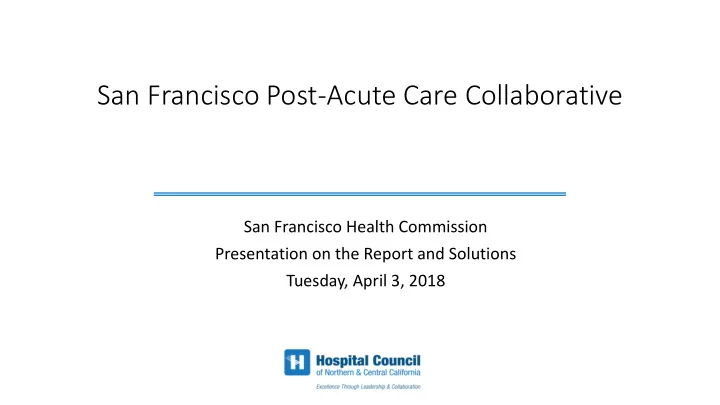

San Francisco Post-Acute Care Collaborative San Francisco Health Commission Presentation on the Report and Solutions Tuesday, April 3, 2018
SAN FRANCISCO POST-ACUTE CARE COLLABORATIVE (PACC) SF Post-Acute Care Project Report is Released, recommendations: • PACC creation • Hospital Council sponsor February 2016 PACC Convenes • Healthcare leaders from public and private sectors – Public/Private Partnerships • Facilitate, deliberative, and data driven process March 2017 PACC Establishes Mission/Vision and Identifies High-Risk Populations • To identify implementable, financially sustainable solutions to the post-acute care challenge for high- risk individuals in the city and County of San Francisco June • Deliberative process to identify populations – Cognitively Impaired and Behaviorally Challenged 2017 PACC Approves Report with Solutions • Standardized Level of Care Assessment Tool • Roving Placement Team November • Access to Supportive Living Alternatives 2017 San Francisco Section adopts PACC Report • Next steps February 2018
A Delib liberative and Data Driv riven Pro rocess Poin int-In In-Time Survey Results – April 20, , 2017 140 117 120 100 80 60 42 38 36 40 20 0 Total Number of Number of Patients Number of Patients Number of Patients Patients Waiting Waiting 3-10 Days Waiting 11-39 Days Waiting 40+ Days
Target Population Post-acute care patients requiring 24/7 supervision Cognitively References an inability to independently self-manage impaired activities of daily living (ADLs) Post-acute care patients with the following diagnoses: • Traumatic brain injury Behaviorally • Cognitive impairment from dementia, substance Challenged abuse, hypoxia • Mental health disorders: psychotic, mood, personality, and/or substance abuse
Recommended Solutions Solution # 1 Adopt Level of Care Utilization System (LOCUS) for standardized post-acute care placement assessment Solution # 2 Citywide Roving Placement Team Solution # 3 Increase Access to Residential Care Facilities for the Elderly and Independent Housing with Wraparound Services
Recommend
More recommend